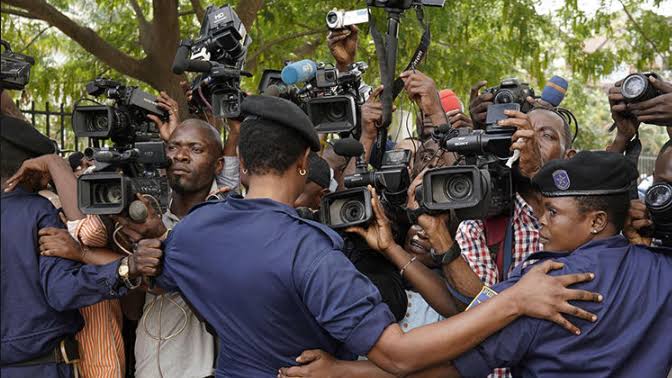COVID-19: African Journalists Harassed, Jailed Over Reports

Journalists across the world have been facing hostility from government forces as they cover issues pertaining to the COVID-19 pandemic and Africa journalists are also involved.
The Committee to Protect Journalists (CPJ), a nonprofit that advocates press freedom worldwide, has released statements in the past few weeks to condemn the attacks.
The statements reveal a trend of intimidation, arrests, and wrongful prosecution by governments who are not comfortable with the works of reporters in at least five African countries.
The Liberian government in March questioned Charles Bioma Yates, a publisher and talk-show host, over a post on Facebook, where he shared commentary that alleged “corruption by the Liberian government and unequal application of quarantine rules for people coming to Liberia from abroad”.
He was accused of being “critical of the government” and was kept at the office of the National Security Agency for many hours during separate visits.
Joel Cholo Brooks, the publisher of GNN Liberia, and Frank Wornbers Payne, a reporter with Magic FM radio station, were also harassed over stories about the government’s enforcement of social restrictions and the people’s level of compliance.
In another instance, policemen sprayed a hand sanitiser at the face of radio director Molley Trojan Kiazolu and seized his phone for live-streaming how they enforced social distancing rules.
In Niger, Kaka Touda, an independent journalist who publishes news on Twitter and Facebook, was arrested in the first week of March.
Four days later, he was charged under the country’s recently passed Cybercrime Law for the “dissemination of data likely to disturb public order”. He had written about a suspected COVID-19 case at a local hospital.
Also in March, Egypt revoked the licence of The Guardian after its reporter, Ruth Michaelson, wrote a report that was sceptical about state statistics regarding the pandemic. The government, in its statement, also threatened to extend the same treatment to The New York Times.
On Friday, March 27, Ethiopian authorities arrested Yayesew Shimelis, a journalist and television host. He was arraigned the next day and the court granted the police leave to detain him without charge for six days.
Yayesew had published a report about the pandemic on Facebook and YouTube, which the Ethiopian Ministry of Health condemned. The police on Thursday, April 16, accused him of violating the country’s anti-terror laws after appealing a court order granting the journalist bail.
In Somali, a journalist, Abdiaziz Ahmed Gurbiye, was picked up on Tuesday, April 14, by the police for criticising the government’s COVID-19 response on Facebook. He has been in detention since then and was arraigned over allegations of spreading misinformation and offending the honour of the president.
Somalia, which is ranked 164th out of 180 countries on the 2019 World Press Freedom Index, is the only African country to have recorded the killing of a journalist as a result of their work in 2020.
Egypt, Ethiopia, Liberia, and Niger are respectively ranked 163, 110, 93 and 63 respective by Reporters Without Borders in the same index.
Nigeria, which ranks 120, was also criticised by CPJ for declaring in March that 92 journalists covering the Statehouse would no longer have access to the presidential villa due to the pandemic, while retaining only 16 others.
The Committee’s Africa programme coordinator, Angela Quintal, noted that “all efforts should be made to enable the press to do their work and cover the coronavirus crisis safely and without risk of official sanction.”
It is not in all cases that the governments resort to arrest and prosecution when they disagree with journalists. In Sierra Leone, investigative journalist Fayia Amara Fayia was “severely beaten” by soldiers for taking pictures of a quarantine facility from a distance. According to the Media Foundation for West Africa (MFWA), he was then detained at a police station until his colleagues secured his release and took him to a hospital.
Likewise, in Nigeria, a Department of State Security (DSS) operative was reported to have maltreated Angela Nkwo-Akpolu, Leadership Newspaper’s correspondent in Imo State.
While reporting about the pandemic and a hotel ordered to quarantine its guests, the law enforcement agent seized Nkwo-Akpolu’s prescription eye-glasses and deleted pictures from her iPad.
A Punch Newspaper circulation vehicle was also attacked and had its tyre deflated by soldiers on March 29 at the border between Rivers and Bayelsa states.
“They also stopped ThisDay truck carrying newsprint from coming into the state,” the driver said.
In yet another incident, on April 2, 12 journalists, at the Nigeria Union of Journalists (NUJ) Secretariat in Adamawa, were arrested and detained by policemen who accused them of breaking the lockdown order. This is in spite of the fact that journalists have been classified as providers of an essential service and so are free to move about in the exercise of their job.
The MFWA condemned the various acts of press freedom violation and said they undermine the ability of the media to carry out their statutory duties.
“At this critical moment when the public is in dire need of information about developments surrounding the COVID-19 pandemic, the least expected of a state agency is cooperation,” the foundation said.
Support Our Journalism
There are millions of ordinary people affected by conflict in Africa whose stories are missing in the mainstream media. HumAngle is determined to tell those challenging and under-reported stories, hoping that the people impacted by these conflicts will find the safety and security they deserve.
To ensure that we continue to provide public service coverage, we have a small favour to ask you. We want you to be part of our journalistic endeavour by contributing a token to us.
Your donation will further promote a robust, free, and independent media.
Donate HereStay Closer To The Stories That Matter




